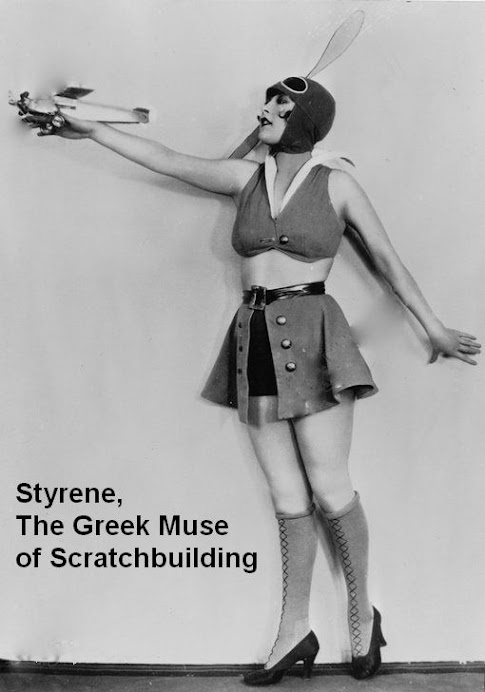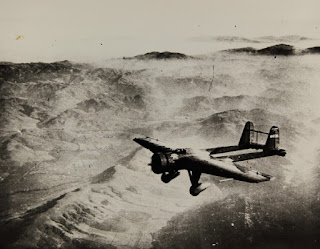(Images from the SDASM photostream, more can be seen here):
https://www.flickr.com/search/?user_id=49487266%40N07&view_all=1&text=%22vance%20aircraft%20co%22
When is a Flying Wing not a Flying Wing?
When it isn't a Flying Wing, of course, as in this case.
Designs with twin boons holding tail feathers (sometimes called "outriggers") were many times in the past labeled as flying wings. Here are two early examples of "flying wings" I scratched: a Northrop "Avion":
https://wingsofintent.blogspot.com/2014/04/scratchbuilt-172-northrop-avion-flying.html
and an EMSCO "Flying Wing":
https://wingsofintent.blogspot.com/2016/03/emsco-flying-wing-172nd-scale.html
Nonetheless, the Vance* Viking NR12700 -later renamed Mason Meteor- was ubiquitously called a flying wing. Looking mightily impressive and splendorously beautiful, especially amidst the designs of the still ongoing biplane era, it didn't fly extensively, but was involved in several announces of daring feats of long-distance flights that never materialized (it also withdrew from the 1932 the Bendix cup as #61, and quit the McRobertson piloted by Murray B. Dilley who had acquired the plane). Later in the hands of Pangborn and Mason dropped a flight to Japan, and another to the European continent. One could say that the plane was more famous for the flying it didn't do than for the flying that it did do. It began life as a proposed cargo/fast mailplane with just one occupant -the pilot- and a biplane stabilizer, but morphed into a long-distance challenger with two occupants and single stabilizer, with modifications to the cockpit and nose sections (at least three different canopy arrangements can be discerned from photos). Various painting schemes can be seen too. It was designed by Claire Vance, reputedly built by his own company, and assembled at the Boeing School of Flying. It changed ownership many times and ended up in litigation between various parties. Several plans depict it as having a three-blade prop, but not a single photo I have shows that, instead it's seen invariably with a two-blade prop. The engine appears in photos with a front shield or bare. Fascinated as I am for the bizarre, unusual and odd, I was delighted to start this project that I had on file for quite some time. Contrary to my usual oddballs that only a mother (and me) could love, in this case the rarity is accompanied by extremely pleasant lines.
*(apocryphally reputed as a distant relation of Vance Gilbert, a flying musician)
The beginnings. Tail components already scratched with a double surface, engraved, structured envelope. Was lucky to have in the spares bin some wheel pants that did the trick after some tweaking, together with a pair of wheels. The tailbooms were fabricated. The wing constructions is just starting, spar and subspar already prepared. The center section was covered in metal, and stab and wing outer panels were plywood-covered, so no rib embossing there:
Found a cowl that was promptly modified (looks like a remnant of a Matchbox kit), and an engine that I built for some reason and then stored, also scratching the fuselage nose section layering styrene sheet on a brass tube of proper diameter:
To keep my options open, as I didn't decide yet which configuration will be replicated, I made long and short cowls by using the plastic cowl as a plug:
I sometimes keep packaging that may come useful, in this case some cones. I sliced a section of it to cap the front end of the fuselage tube:
Thus:Rendering this:
Construction of the wing starts:
I decided to extend the sub spar, to provide more support for the skin:One skin is folded over and glued. Tabs are added to eventually hold in place the right skin at the centerline:
As I still did not decide if I will use the long or short cowl, I am priming both, plus a spare. Pants and fuselage nose are primed too to spot potential blemishes. I didn't use cowls from the spares bin as the vac parts are scale-thin, unlike the plastic, plus I can vacuform more copies from the plastic part if needed for other projects:The skinned wing:
Parts so far:Preliminary dry run of the booms into the wing:
They butt against the second spar for strength:
The tailbooms are glued and faired. Work has began to insert the short fuselage nose. Landing gear legs are made. The fuselage fairing after the cockpit is made with a modified leftover engine gondola:
Before inserting the nose, a cockpit is fashioned, and the fairings are further worked on:
The cockpit has been installed into the nose, the nose glued to the wing, the stab added to the booms, and the swiveling tailwheel pants glued on too. A wood master was carved to produce a vac part (in white) as the nose fairing under the wing, and that is also put in place:
As predicted above, some work puttying and sanding was necessary to blend all those home-made or modified spare parts. Now ready for another coat of primer to see where the naughty spots are:
Still a few spots that need attention:
Main landing gear on and some spots taken care of:
White is airbrushed as a base for the red color, to provide more vibrancy, otherwise the red is dulled by the grey primer:
The red color is airbrushed:
The engine and cowl are added, as well as the wheels, the elevator and aileron control cables. The cross-rigging of the booms followed. The windshield can be seen on that piece of card:
Still to add: framing on the windshield, exhausts, Pitot, Venturi, and propeller, plus of course the decals, that are on their way.
All in place, now just have to apply the decals:
Remember the scene in Avatar when they are flying in this big sort of pterodactyl, but a much bigger one starts to chase them down?
The set from Arctic Decals arrived:
Completed model:
https://wingsofintent.blogspot.com/2022/06/scratchbuilt-vance-flying-wing-172nd.html





.jpg)
.jpg)
.jpg)
.jpg)
.jpg)
.jpg)
.jpg)
.jpg)
.jpg)
.jpg)
.jpg)
.jpg)
.jpg)
.jpg)
.jpg)
%20(1280x960).jpg)
%20(1280x960).jpg)
.jpg)
.jpg)
.jpg)
.jpg)
.jpg)
.jpg)
.jpg)
.jpg)
.jpg)
.jpg)
.jpg)
.jpg)
.jpg)
.jpg)
Fascinating and with an inline engine more beautiful. I assume you had a decent set of plans.....or are you....winging it? Coming in on a wing and a. Dum Di Dum 🌻🐞
ReplyDeleteThanks. By "inline" I take it that you mean "radial", unless you referred to its obedience.
DeleteAnd yes, fortunately this time there were plans easily found on the Net, but not to trust 100%, as usual. Saves lots of time, though.
Cheers
Humpty Dumpty